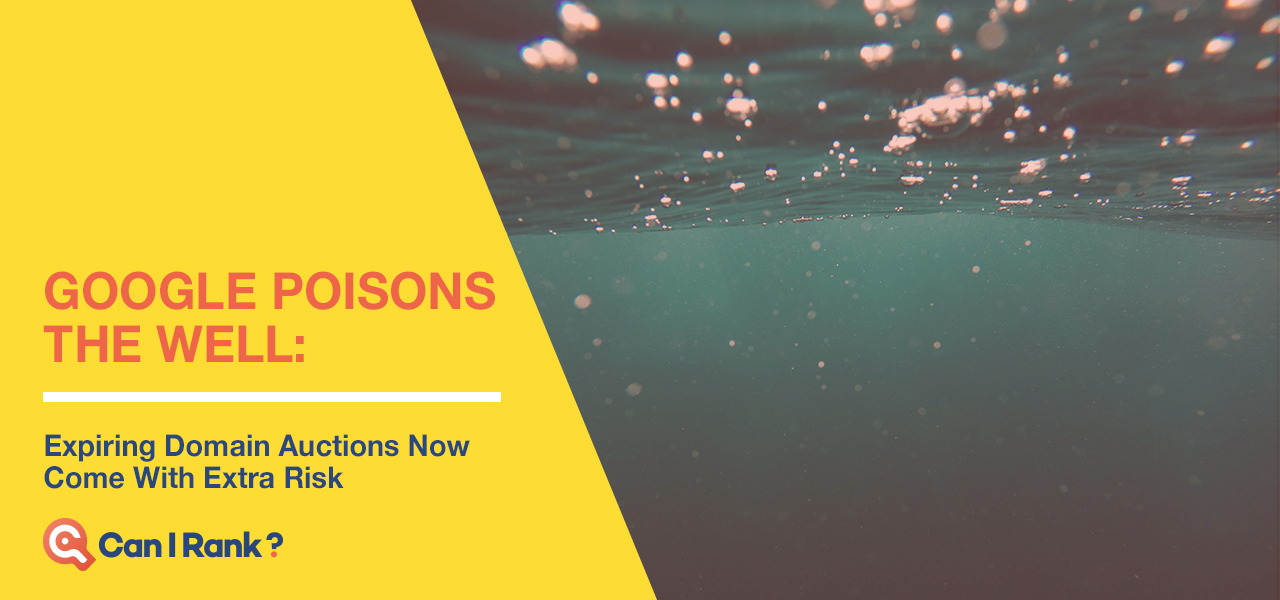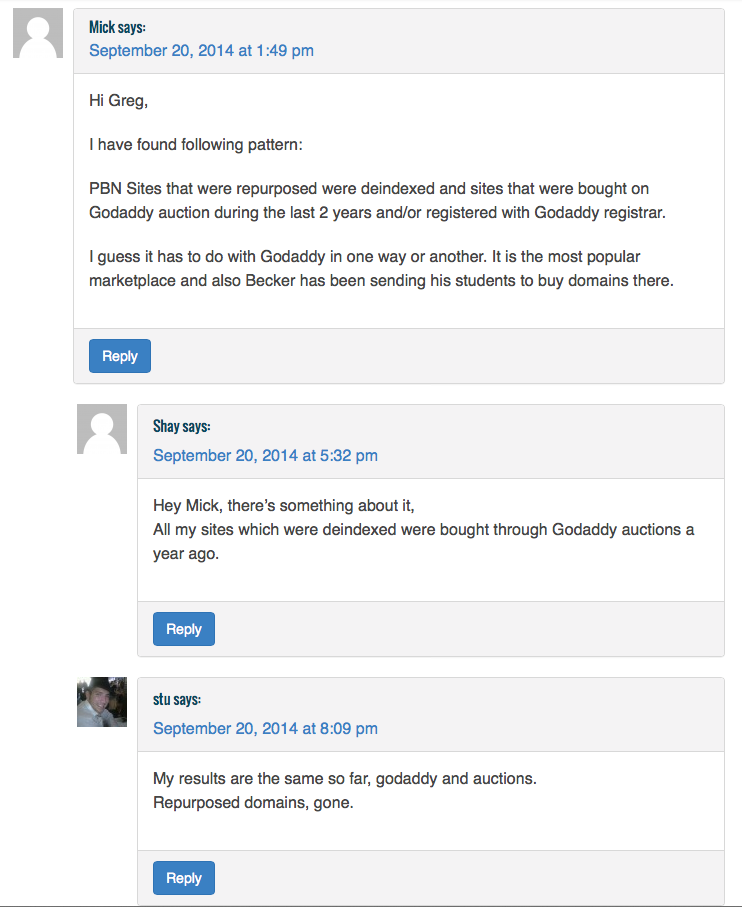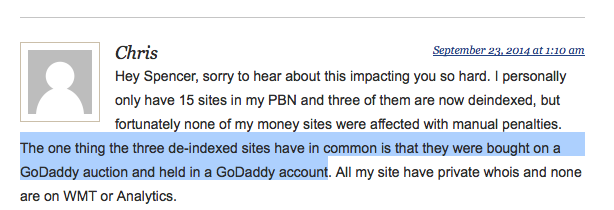In medieval times desperate defending armies would sometimes dump diseased corpses into wells as they retreated. Rank with bubonic plague or tuberculosis, the well water became undrinkable, crippling the advancing army by depriving them of safe water sources. Never mind that this kind of scorched earth tactic also hurt the defenders’ own countrymen, depriving entire villages of their sole source of clean water: the end justifies the means, right?
Now it seems that Google has dipped into the history books with the latest tactic in their long-running war on manipulative SEO. Early evidence suggests that purchasing domains from expired domain auctions may have been one of the signals used to detect and deindex Private Blog Network (PBN) sites in a recent mass penalty.
In other words, if you build a website on a previously expired domain purchased through GoDaddy Auctions, NameJet, or other expiring domain auction sites, you’ll now need to be extra careful to avoid having your domain classified as a PBN site and penalized or even completely deindexed.
That’s right: the well of expiring domain names has just been poisoned, depriving us all of one of the best sources for quality domain names at affordable “wholesale” prices. Anyone wishing to avoid the risk of being classified as a PBN site is now left with only two options to save your domain and your investment: pay a premium to buy a domain on the secondary market, or register an inferior, but available, domain name.
How does Google detect PBN websites?
Modern machine learning algorithms such as those deployed by the search engines often rely upon a combination of signals to classify or evaluate websites. For example, we might build a classifier to identify animals like this:
| Animal Classifier | ||
| Color: | gray | gray |
| Trunk: | yes | no |
| Tail: | yes | yes |
| Size: | Huge | Tiny |
| Result: | Elephant | Mouse |
Note that not all gray, tailed animals are elephants, just as not all low-quality sites built on expired domains are part of a Private Blog Network: some are just crappy websites, indicative of incompetence perhaps, but not nefarious intentions. If we were building a classifier to detect Private Blog Network websites, we might look for a number of signals that these sites have in common:
- built on expired domains recently purchased at auction
- templated site design
- minimal, low-quality content
- shared ownership or footprint with many similar sites
- low-cost web hosting
- no quality inbound links or social signals
- no brand signals
- characteristic outbound linking patterns
In other words, purchasing an expired domain at auction is not in itself enough to get your site penalized, and it’s unlikely to be so in the future. However, it is very possible that it is one of the signals used by Google. Early reports from folks who had their PBNs deindexed seem to suggest that this is the case:
Greg from NoHatDigital shared that all of their sites built on expired domains purchased in domain auctions, including those that were fully-developed sites and not PBN sites, were deindexed:
Many commenters at NoHatDigital shared similar experiences:
Finally, some commenters at NichePursuits indicated that their deindexed sites were also expired domains purchased at auction via GoDaddy:
A War on Domainers & the Impact on Expired Domain Auctions
While most people talk about Google’s war on web spam and its unintentional collateral damage to the domains of small businesses and hobbyist publishers, the search behemoth hasn’t been generous to the domain industry in recent years either. First, they pulled the rug out from under the domain parking industry with massive, unexplained revenue declines of 70-80%, even as PPC in general continued to grow. At the same time, their increasing algorithmic preference for big brands has hampered demand for new domains as it becomes more and more difficult for smaller websites to compete, forcing them to turn to social media and author platforms to make their voice heard. More recently the Exact-Match Domain update slashed the value of keyword domain names. Now, the latest moves to turn expired domain names into a spam signal threaten to destroy one of the last healthy areas of the domain industry, the expiring domain marketplaces.
Moving Forward: Better Deals If You Can Avoid Becoming a False Positive
Though it’s too early to see the impact this change will have on the expiring domain name market, my opinion is that we will see reduced demand and lower prices for expiring domain names with strong backlink profiles. If this turns out to be just one in a series of Google attacks on expired domains, we could see SEO buyers disappear from expiring domain auctions completely. On the other hand, that change is unlikely to result in lower prices for quality premium domain names, as those two segments of the market rarely overlap (SEOs usually purchase low-quality domains with strong backlink profiles, and are priced out on quality domains with high resale value.)
I would still be willing to take the risk of building a new website on an expired domain name, as long as I knew I could avoid being falsely classified as a PBN site. Some ways to avoid being labeled a false positive might include:
- Use unique whois info that doesn’t overlap in any area with your domain portfolio or other websites
- Have only a small number of high-quality websites in your Google Webmaster Tools, Google Analytics, AdSense, etc.
- Add high-quality original content with rich media, images, many outbound links, etc.
- Build a brand: about page, social media profiles, strong inbound links, press, brand mentions, etc.
- Use a quality custom site design
- Go easy on affiliate links and AdSense




I think if you create a useful site out of the expired domain, you wouldnt have any issues with google. Add or create original videos, write quality long post, share them everywhere. In other words, make it better to what it was before.
Thanks aton for the insightful article.
Theres a question I have . Please help me out if you can . If I buy expired domain with pr da pa etc then is it all gone when i register it in my name? Do I have to buy expiring domains or expired domains for seo value? Thanks
Hi Bilal,
Yes, that’s correct: Google tries to “reset” the Page Rank/ authority of a domain after it expires. But most of the domains sold through expiring auctions like GoDaddy Auctions or NameJet don’t actually expire, so the search engines have trouble knowing that they changed hands and should reset the authority. Therefore you can sometimes “revive” a domain’s Page Rank or authority after it goes through an expiring auction, by quickly replacing the content of the expired domain with content similar to what was on the old website.
Thanks for the insights . So it is a good idea to replace content quickly on the prospective websites .What if the content on this site is high quality? We should not face these problems buying a domain that has not expired right?
Nope, resetting PR in this context only applies to expiring domains.
Ok got it . Thanks
well done. I agree with all you say. I’ve not seen old domains I bought “come back” much even when they have very powerful backlinks and were bought at auction after being parked. But I only got them 1-3 months ago.
I don’t have extensive experience to know, but I’ve researched some of the backlinks of an expired domains. With my old site I have very few dofollow backlinks so it’s a pretty easy decision, I don’t have much to lose and everything to gain.